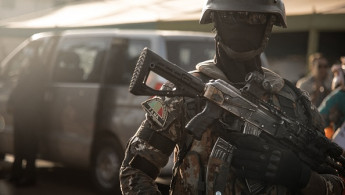Niger President says west African anti-jihadist is 'dead' following Mali withdrawal
Mali's decision to withdraw from a West African anti-jihadist force and regional grouping known as the G5 Sahel is "regrettable," its executive secretary told the UN Security Council on Wednesday, as Niger suggested the body was effectively dead.
The G5 Sahel - which also includes Mauritania, Chad, Burkina Faso and Niger - launched in 2014, with an anti-jihadist force added in 2017 that is now 5,000 strong.
Meanwhile- Mali’s military junta announce withdrawal from the regional G5 Sahel force (launched in 2017 by Burkina Faso, Chad, Mali, Mauritania, and Niger) pic.twitter.com/pDJ3JcqEby
— Samira Sawlani (@samirasawlani) May 15, 2022
Executive secretary Eric Tiare said the group had until now "fought the good fight on two fronts" - combatting terrorism and helping foster socioeconomic development.
The anti-jihadist force "had some successes" in its joint operations, Tiare said, adding: "We are calling on the UN to do more in terms of its support for the G5 Sahel."
Despite repeated requests from UN Secretary-General Antonio Guterres and notably France, the United States has consistently blocked any UN financial or other backing to the group, instead preferring bilateral aid.
In an interview with French media, Niger's President Mohamed Bazoum said the group was effectively defunct after Mali's retreat, which came in protest after it was not allowed to assume the group's rotating presidency.
"The G5 Sahel is dead. Since the second coup in Mali (in May 2021), Bamako has been burying its head in the sand, isolating itself within Africa and depriving us of developing a concerted and coordinated anti-terror strategy," he said.
Bazoum comes out swinging, declares the G5 Sahel dead, wants a larger French presence and more equipment for Niger’s military, and calls on Western forces to take more risks and not be afraid of losses in the Sahel: https://t.co/hCCsENllT6
— Andrew Lebovich (@tweetsintheME) May 18, 2022
France's envoy to the United Nations, Nicolas de Riviere, lamented Mali's withdrawal from the force, as did other Security Council members.
"The G5 has been created by the G5 themselves, so it's up to them to decide what they want to do with it," he told journalists before the Council's session.
Mali's government said Sunday that "the opposition of some G5 Sahel member states to Mali's presidency is linked to manoeuvres by a state outside the region aiming desperately to isolate Mali."
It did not name that country, but appeared to be taking aim at France.
Mali has been since January 9 the target of a series of economic and diplomatic sanctions from West African states to punish the junta's bid to stay in power for several more years, following coups in August 2020 and May 2021.
One of the poorest and most volatile countries in the world, Mali is battling a decade-old jihadist revolt, which began with a regional insurrection and then spread to Niger and Burkina Faso.
Thousands of civilians and soldiers have died, and hundreds of thousands have fled their homes, despite the presence of French, European and African forces, as well as UN peacekeepers.





 Follow the Middle East's top stories in English at The New Arab on Google News
Follow the Middle East's top stories in English at The New Arab on Google News


